Viewings: 6132
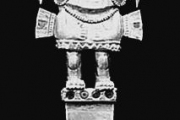 As confirmed by research scientists, Incas ruled on the vast territory of the Pacific coast of America and in the highlands of the Andes. In the XV century, their Empire was the largest and most powerful state of the continent.
Viewings: 6297
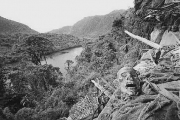 More than 500 years mummy concealed the secret of civilization white people in Peru. However, recently the American archaeologists have found an ancient burial caves in the high mountains, lost in the Peruvian forests around lake Condors. Found the body embalmed in unusual positions: their hands and cover their eyes, as if salonas from something terrible. Sometimes mum sitting, burying face into his knees.
Viewings: 8416
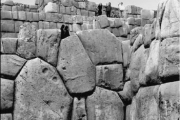 Each continent conceals many mysteries left to modern man of his ancestors. Especially in those places of the Earth, where a civilization suddenly replaced another, "diligently" destroying the previous writing. A classic example of this is America, where conquistadors destroyed the Empire of the Incas and Mayans, who in the us mainly came only a majestic architecture, baffling archaeologists and architects. Scientists are puzzled: how were they built?
Viewings: 7218
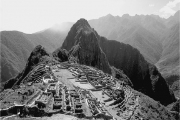 At an altitude of 3,650 meters in the Andes of Peru, over the raging rapids of the river Urubamba is amazing, the lost from all over the world Inca city of Machu Picchu. Legends tell that its founder was Manco Capac - "son of the gods who came down with the sun", the ruler of a vast Empire Tawantinsuyu arising believed to historians, in the XII-XIII centuries, however, The Indians claimed that the city has appeared in the times Puripica, i.e. in the period of darkness", perhaps even in the pre-glacial epoch.
Viewings: 6695
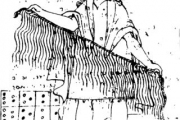 Long time was considered that one of the greatest ancient civilizations - Inca Empire was "only" a civilization of the bronze age, who knew no script. But last summer was published the book Harvard Professor Gary Urthona "Signs of the Incan pile, which suggests that the Incas writing all the same there was, however, special, disguised as a colored rope, tied in knots. We are talking about nodular letter stack (in Quechua, the language of the Incas - "quipu" means "site"). After Ortona more and more scientists are inclined to think that with a pile of things are not so simple...
Viewings: 6056
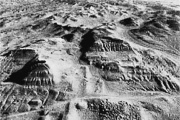 Almost a century, from the time of their discovery by archaeologists, scientists argue about the origin in the Peruvian desert Nazca huge and not very geometric shapes and figures, the so-called geoglyphs ("geo" - in translation with Greek - earth, glyph - concave line). Put forward a variety of hypotheses, often contradicting each other. Italian archaeologist Giuseppe Orefici, however, believes that it is possible to explain these mysterious figures of the Nazca desert, if we turn to be pushed into Oblivion the city Sawasi - the cradle of civilization Nazca.
Viewings: 7183
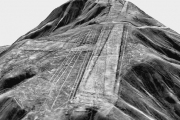 Few people know that the Nazca lines is not the only complex with a huge images on it. Just 30 km North from the town of Nazca is a small town Palpa, in the vicinity of which the plateau Pampa-Palpa is a huge number practically unexplored geoglyphs. The local population they were known but the interest of scientists attracted to them only in the early 1990's researcher of the mysteries of the past Erich von d?niken. As in Nazca plateau of Palpa the main part of the image is the stripes and lines, but there are figures. However, the complex Palps differs significantly from neskantaga.
Viewings: 6396
 First saw geometric shapes on the famous Nazca plateau American archaeologist Paul Cosquer. Scientist with astonishment looked from the aircraft in the improbable kaleidoscope of trapezoids, triangles and spirals, littered the desert three hundred kilometers from the capital of Peru, Lima. Absolutely straight lines dissected plateau in all directions and ran away beyond the horizon, as though oblivious of hills and gorges. And between the towns of Nazca and Palpa spread unique "desert zoo" - a giant shape of birds, snakes, monkeys, cetaceans, and even insects. It turned out that the technique of drawing the giant figures was quite simple: should just move the stones, revealing the soft earth, and put them in a row. That took years, but the images could be saved in this arid area for thousands of years!
Viewings: 7046
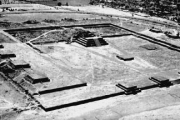 50 km to the northeast from the Mexican capital are the ruins of a mysterious ancient city. Scientists managed to establish, that unique city-state was founded approximately in 100 BC and successfully existed for about 850 years. In time of its blossom he had a population of 150 to 200 thousand people, and its cultural impact was extended to the territory of Guatemala and Belize.
Viewings: 7011
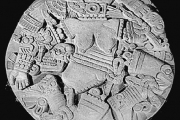 The night of 21 February 1978 in the heart of Mexico city, on the corner of the streets of Guatemala and Argentina, workers of city electric utilities have been excavating. Piercing the thick concrete floor and penetrated into the ground two meters, they suddenly came across a layer of stone. Clean the surface of the stone sticking clay workers found it a relief image and decided to put off the work till morning. To identify findings on the phone urgently summoned a group of archaeologists from the National Institute of anthropology and history. on 23 February, it was found that the find is a part of the monolith with specialized image of a human face and headwear.
Viewings: 6479
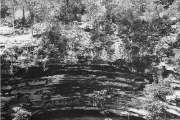 From this huge natural well in a karstic crater ancient Maya, despite the drought, never took water for irrigation or drinking. Sacred well in Chichen Itza was a place of religious pilgrimage came here to offer sacrifices Hume-Chuck - God of forests and fields. Were thrown into it not only jewelry, but also beautiful girls, and even children.
Viewings: 6262
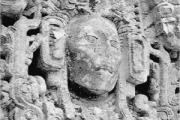 In late 1998, in the mountains of Honduras (near the border with Guatemala) began the evacuation of the local population in the Copan valley. Special event was due to the danger which carried with them coming here hurricane Mitch.
Viewings: 6317
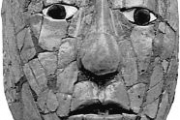 On held recently in the capital of Ireland, Dublin archaeological Congress re-emerged lively debate around the so-called "skull Mac-Carmike".
Viewings: 5374
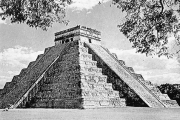 Before the conquest of South America by the Spanish city of Chichen Itza was one of the major cultural centers of the Maya state. Its majestic temples built in the form of huge truncated pyramids, still amaze people with their magnificent architecture. In the heart of numerous cult buildings stands thirty-metre high pyramid of Kukulkan. It rests on a huge square Foundation whose side is equal to 55 PM According to a recent research scientists, thanks to this "stone pillow", consisting of nine superimposed on each other squares, this is a religious building has phenomenal seismic resistant. On each side of the temple is a huge ladder comprising 91 level. At the very top, on the platform, is a kind of sanctuary. The number of steps all four staircases, including the top, is 365, which, in turn, is the number of days in a year.
Viewings: 6635
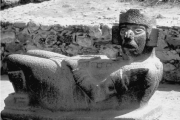 At the beginning of the II Millennium hordes mysterious tribes Toltec invaded the Yucatan Peninsula and the subjugated tribes of the Maya. Warlike people created a powerful state, which relied on a well-armed army. Judging from the surviving legends, main power Toltec was their weapon, which was much better things than that owned the surrounding tribes. But what it was, remained unknown.
|






























